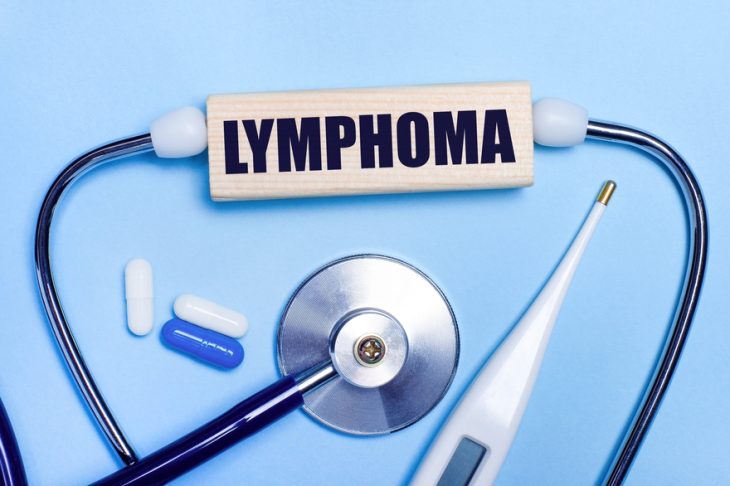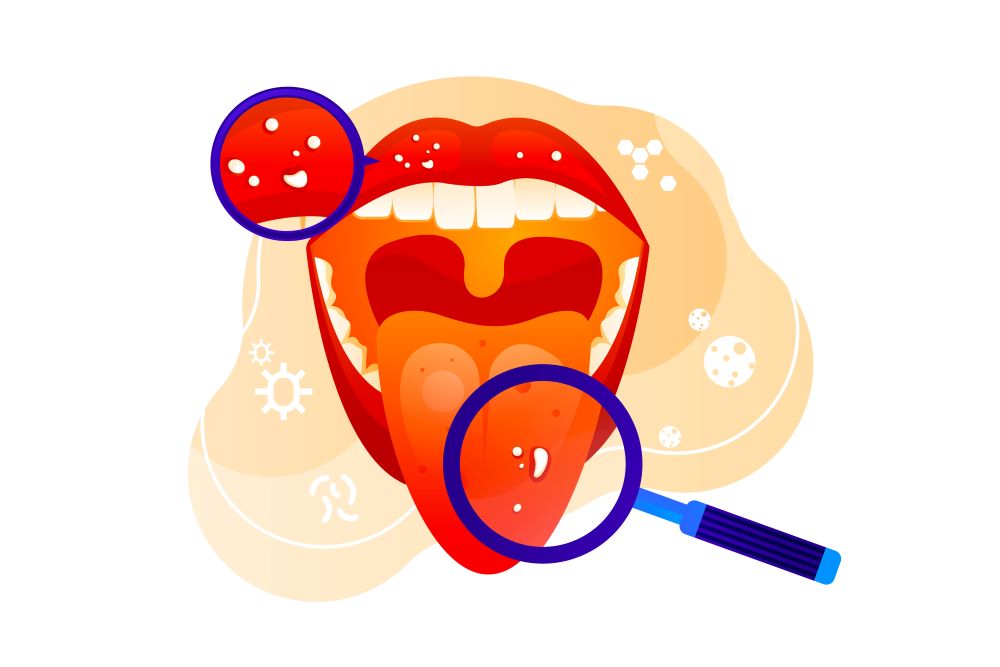
Recognizing Tongue Cancer: Symptoms, Risks, and Treatment
Tongue cancer is a type of oral cancer that develops in the tissues of the tongue. It can appear as a lesion, ulcer, or lump that doesn’t heal and can cause significant discomfort and complications if not detected early. Recognizing the symptoms, understanding the risk factors, and exploring the available treatment options can help in early diagnosis and effective management.
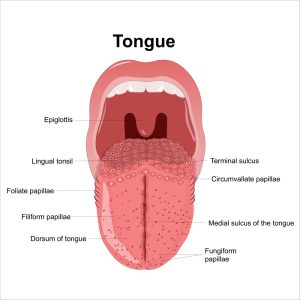
Symptoms of Tongue Cancer
Identifying tongue cancer in its early stages is crucial for successful treatment. Some common symptoms include:
Early Symptoms:
- Persistent Sore or Ulcer: A sore that doesn’t heal within two weeks.
- Red or White Patches: Unusual discolouration on the tongue.
- Pain or Discomfort: A persistent pain or tenderness in the tongue or surrounding areas.
- Difficulty in Chewing or Swallowing: Discomfort while eating or drinking.
- Unexplained Bleeding: Spontaneous bleeding without any apparent injury.
- Lump or Thickening: A noticeable lump or thickened area on the tongue.
Advanced Symptoms:
- Numbness in the Tongue or Mouth: A loss of sensation in part of the tongue.
- Ear Pain: Unexplained ear pain that does not go away.
- Difficulty Speaking: Slurred speech or difficulty moving the tongue.
- Swollen Lymph Nodes: Lumps in the neck due to the spread of cancer to lymph nodes.
- Unintentional Weight Loss: A common symptom of advanced cancers.
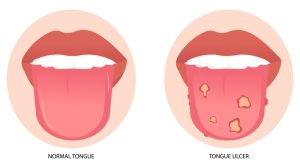
Risk Factors for Tongue Cancer
Several factors contribute to the risk of developing tongue cancer. Some of the most common include:
- Tobacco Use: Smoking cigarettes, cigars, pipes, or chewing tobacco increases the risk significantly.
- Excessive Alcohol Consumption: Heavy drinking, especially when combined with tobacco use, enhances the risk.
- Human Papillomavirus (HPV) Infection: Certain strains of HPV, especially HPV-16, are linked to oral cancers.
- Poor Oral Hygiene: Chronic inflammation and infections in the mouth can contribute to cancer development.
- Weak Immune System: Conditions like HIV/AIDS or immunosuppressive treatments can increase susceptibility.
- Genetic Factors: A family history of oral cancer may increase the risk.
- Age and Gender: More common in individuals over 50 and slightly more prevalent in men than women.
- Poor Diet: A lack of fruits and vegetables can increase the risk.
- Chronic Irritation: Ill-fitting dentures or persistent biting of the tongue may lead to chronic irritation and cancerous changes.
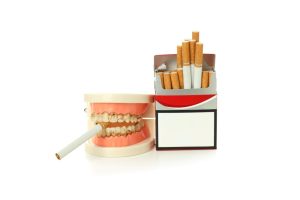
Diagnosis of Tongue Cancer
Early detection of tongue cancer improves treatment outcomes. The diagnosis usually involves:
- Physical Examination: A dentist or doctor examines the tongue and oral cavity for visible signs.
- Biopsy: A tissue sample is taken for microscopic examination to confirm cancer.
- Imaging Tests: CT scans, MRI, and PET scans help determine the stage and spread of the cancer.
- HPV Testing: In cases where HPV infection is suspected, testing may be done to check for the virus.
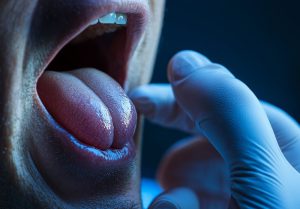
Treatment Options for Tongue Cancer
The treatment for tongue cancer depends on its stage, location, and overall health of the patient. Common treatment options include:
1. Surgery
Surgical removal of the tumour is often the first-line treatment, particularly for early-stage tongue cancer. In some cases, a portion of the tongue may need to be removed (partial glossectomy), followed by reconstructive surgery.
2. Radiation Therapy
High-energy radiation is used to target and destroy cancer cells. It may be used as a primary treatment or post-surgery to prevent recurrence.
3. Chemotherapy
Chemotherapy involves the use of drugs to kill cancer cells, often in combination with radiation therapy for advanced cases.
4. Targeted Therapy
This treatment uses drugs that specifically attack cancer cells by targeting their molecular properties, reducing damage to healthy cells.
5. Immunotherapy
Immunotherapy helps boost the body’s immune system to recognize and attack cancer cells, typically used in cases where the cancer has spread significantly.

Prevention of Tongue Cancer
Though not all cases of tongue cancer can be prevented, some lifestyle changes can significantly reduce the risk:
- Avoid Tobacco and Alcohol: Eliminating or reducing smoking and alcohol intake lowers risk factors considerably.
- Maintain Good Oral Hygiene: Regular dental checkups and proper oral care can help prevent cancerous changes.
- Eat a Healthy Diet: A diet rich in fruits and vegetables boosts immunity and reduces cancer risk.
- Get Vaccinated for HPV: HPV vaccination can help prevent HPV-related oral cancers.
- Regular Cancer Screenings: Routine oral exams can help detect precancerous lesions early.

Conclusion:
Awareness of the early signs of tongue cancer, knowledge of its risk factors, and prompt medical attention will make treatment easier. Improvements in medical treatments have raised survival chances, though not so much as that which accrues from early disease detection. Avoiding risk factors for tongue cancer can significantly reduce one’s chances of getting the disease. With or without noticeable symptoms, one should visit a healthcare practitioner soon to get the right diagnosis and treatment.
FAQ’s:
- How does tongue cancer affect overall health?
Tongue cancer can significantly impact overall health by affecting the ability to speak, eat, and swallow. Advanced cases may lead to severe pain, significant weight loss due to difficulty in eating, and complications from spreading to other parts of the body. Early detection and treatment are crucial for maintaining quality of life.
2. What are the potential complications of tongue cancer?
Potential complications of tongue cancer include speech difficulties, swallowing problems, and a decrease in the ability to taste food. Surgery for tongue cancer can sometimes result in changes to the appearance of the face and mouth. There may also be emotional and psychological impacts due to changes in appearance and function.
3. Is there a genetic component to tongue cancer?
While most cases of tongue cancer are not directly linked to genetic factors, having a family history of cancer can increase an individual’s risk. It’s believed that some genetic mutations might make some people more susceptible to the effects of known risk factors like tobacco and HPV.
4. How often should someone be screened for tongue cancer?
There are no standard screening tests specifically for tongue cancer for the general population. However, individuals at higher risk (like smokers or heavy drinkers) should have regular oral examinations by a dentist or doctor, who can often detect early signs of tongue cancer or precancerous conditions.
5. What is the survival rate for tongue cancer?
The survival rate for tongue cancer varies widely depending on the stage at diagnosis and other factors. Early-stage tongue cancers have a much higher five-year survival rate compared to advanced stages. Treatment success also depends on the cancer’s response to treatment and the overall health of the individual.
6. Can tongue cancer recur after treatment?
Yes, tongue cancer can recur after treatment. The risk of recurrence depends on several factors, including the stage and initial treatment success. Regular follow-ups are necessary to monitor for any signs of recurrence, as early detection of a recurrence can increase the chances of successful treatment.

